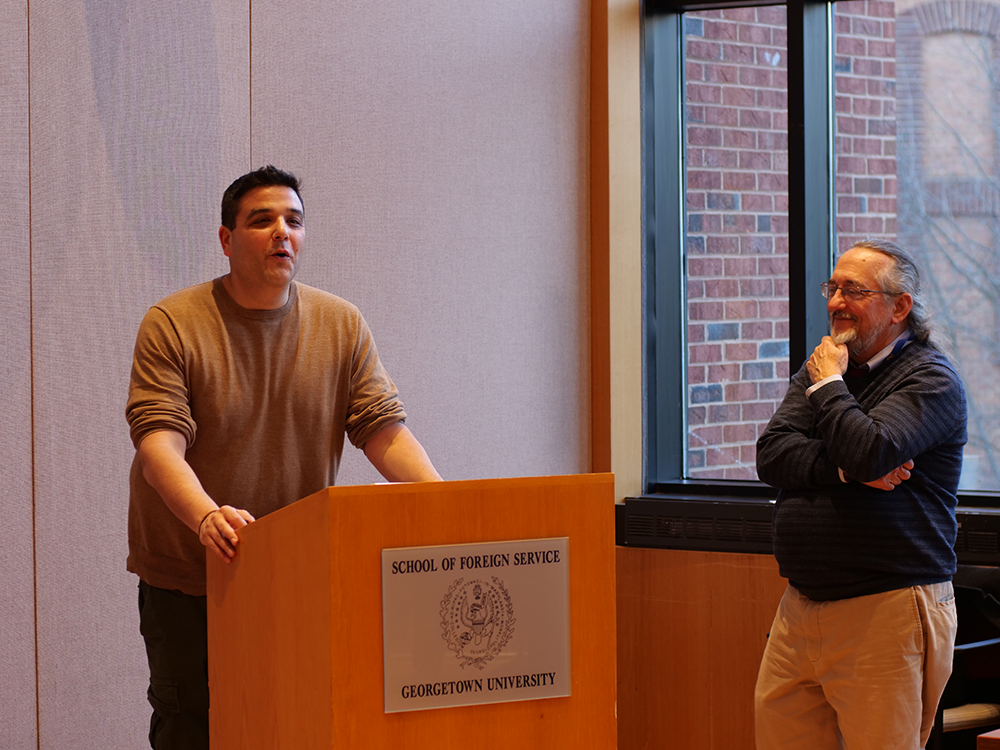Immigration policies enacted under President Donald Trump’s administration have harmed the global reputation of the United States regarding refugee protection, two United States Citizenship and Immigration Services (USCIS) union members said at a Jan. 21 event.
USCIS operates as a division of the Department of Homeland Security and features two branches supervising refugee affairs and the asylum programs within the agency. The event featured two representatives from the American Federation of Government Employees’s (AFGE) National CIS Union. The AFGE is the largest federal government employee union and exclusively oversees the National CIS union, the body that represents USCIS employees.
Asylum officer Michael Knowles, who serves as a special representative for the National CIS Council 119, which represents 14,500 USCIS employees, spoke at the event. Jason Marks, a union representative with the AFGE branch that represents USCIS employees of the Washington, D.C. area, also addressed students. Both Knowles and Marks spoke in their capacity as a union members at the event, titled “A Conversation with the USCIS Asylum Officer’s Union,” hosted by the Institute for the Study of International Migration.

Prior to U.S. President Donald Trump’s administration, many USCIS employees and migration experts viewed U.S. refugee and asylum programs as functional and well-organized, despite partisan disputes over several smaller issues linked to migration, according to Knowles.
“We don’t usually get involved in public policy, especially in the area of asylum, because frankly at least from our point of view, it’s been a pretty good program, and the employees have been usually well-engaged in helping create and build and perfect that program over an almost 30-year period of time,” Knowles said. “There are always disagreements about how many we should bring in and law enforcement considerations and vetting and making sure our national security is covered.”
Though the CIS union branch has focused on advocating for workers in the past, they have increased their attention to include advocacy for various issues since 2017. The National CIS Union 119 wrote an amicus brief to the United States Supreme Court concerning the Trump administration’s travel restrictions on seven different countries in Sept. 2017. After a series of appeals, a different version of the restrictions was ultimately upheld by the Supreme Court. On Jan. 21, Trump reportedly considered adding new restrictions on seven additional countries, according to the Wall Street Journal.
The union decided to file their amicus brief to lend their experience to the case, according to Marks.
“You know we felt, in talking to these folks, talking to these advocacy groups, you know, that the court would want to hear from the folks who actually do this work,” Marks said. “And we approached this, you know, so we found a lawyer that would handle this on behalf of our union, we worked with this legal team, we worked with our members, and essentially we filed a brief in support of the petitioners who were opposing the travel ban.”
In past decades, the U.S. has led the international community on accepting refugees, those who have fled their country of origin, and asylum seekers, people searching for protection out of fear of persecution. The 1980 Refugee Act raised the annual refugee admission ceiling and established communication policies and regulations between Congress and the President about refugee and migration issues.
After the act passed, the U.S. emerged as a global leader on this immigration policy, according to Marks.
“The United States has been the world leader in refugee resettlement by far,” Marks said. “I think out of all the other countries in the world combined, it doesn’t even come close to the numbers of refugees the U.S. has resettled since 1980, probably more before that, until 2018 or 2019 when Canada actually started to resettle more folks than we did.”
Current rhetoric and policies pushed forward by lawmakers under the Trump administration contrast previous U.S. conduct around immigration, according to Knowles.
“Refugees and asylum was always a very patriotic thing. It was always good politics, whether you were left, right, or center until 2017, when we saw this new administration coming in,” Knowles said. “One of their signature campaign things, and now we’ve seen one of their signature wrecking balls, I don’t know how else you could call it, has been to radically change the face of immigration without any legislative action whatsoever.”
While many of the policies enacted by the Trump administration have more visible short-term effects, the long-term impacts of the policies are more serious and unseen by the American public, according to Knowles.
“But it does, long term, has dire implications for our institutional capacity,” Knowles said. “Let’s suppose we have a new administration in a year, or four, whatever it is, it’s really hard to rebuild what the wrecking ball has done and we have lost hundreds of very talented, committed people, not because they weren’t laid off, they just said we’re not gonna be here.”




















